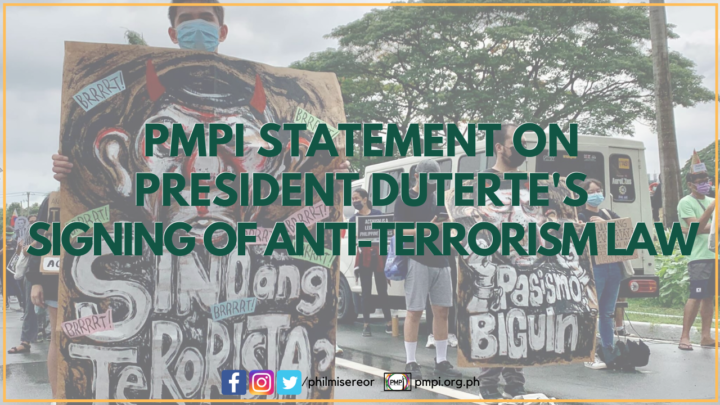On the same day that the number of confirmed COVID-19 cases in the country breached the 40,000-mark, President Rodrigo Duterte signed the controversial Anti-Terror Bill into law without much regard to the clamor of people for a dialogue and to veto the bill.
The promise to pass a new Heal As One Law II to alleviate the suffering Filipino people due to the pandemic has been overshadowed when President Duterte declared Anti-Terrorism Bill as a priority bill, and yesterday, finally sealing it with his signature. A very misplaced priority indeed.
As we call for systematic, efficient, and humane solutions in this time of crisis, the nation was instead “gifted” with this despicable bill, intended to control and manage the growing dissent of people for the government’s failure to address the problems of the poorest Filipinos during the pandemic.
This law will subvert our fundamental rights and liberties, paving the way for a much worse situation than the Martial Law period. The dark days of Philippine history will come to haunt us all over again with this legal measure. It will be like the Damocles sword hanging above us, ready to fall and chop-off our heads.
PMPI will push for the repeal of this “Anti-Terrorism Act of 2020” and join other groups to question its constitutionality. As part of a broader civil society movement that advocates for upholding our bill of rights contained in the fundamental law of the land, as well as laws protecting the rights of the vulnerable groups, we oppose this measure because its vagueness and over-broadness is prone to abuse and can be used to suppress dissent and our activism.
We, the Philippine Misereor Partnership Inc. (PMPI), condemn in the strongest sense the signing of this Act. We believe that this law will further assault whatever democracy is left in the country. A democracy which has been slowly eroded by this President and his minions in Congress since their assumption to power. This is an attack on our failing democracy. Almost a final nail to the coffin.
Thus, even as we foresee that our work to journey and support the struggle of our partner mining-affected communities, peasant and fisherfolk communities as well as the urban poor communities, and even our work to defend the environment, can be easily red-tagged or branded as acts of terrorism, we shall not waver at our commitments.
We will not be fooled by false posturing of peace, compassion, and care for people nor be intimidated by violent and threatening language. We will not submit to fear. We will continue to fight for the rights of people and the environment especially in this crucial time.
We are anxious and enraged. We are worried but definitely not cowed.
Editor’s Note: Under the anti-terrorism law, a terrorist is anyone who participates in any activity which endangers a person’s life, causes damage or destruction to a government facility or private property, develops or possesses explosive devices or weapons, and releases any weapons of destruction. The police and the military can now track down suspected individuals or organizations and record discussions or communications purportedly about terrorism.
Suspected terrorists can be detained without a warrant of arrest to up to 14 days and it may be extended by another 10 days. Anyone who threatens to commit terrorism, perform or incite others to do any such act also will be penalized with imprisonment of 12 years.
The new law repeals the Human Security Act of 2007 by giving more surveillance powers to government forces.










